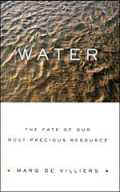作者 伊麗莎白•格羅斯曼
2001年1月9日
沒有水就活不下去,這是最基本的前提。在Marq de Villiers所著【水:我們最珍貴資源的命運】、這本令人印象深刻的書中,引用了一位土耳其實業家的話 : 「數百萬人可以沒有愛情而活著,卻不能沒有水。」

【水:我們最珍貴資源的命運】(Marq de Villiers 著,霍夫頓米佛林公司出版,共352頁,於2000年)
De Villiers在南非長大,現居住在(加拿大)新斯克細亞省(Nova Scotia)。他到處旅遊,考察這世上最重要資源的狀況,結果卻令人沮喪。從非洲到亞洲到澳洲、從歐洲到中東到美洲,太多人所賴以維生的水不僅太少,甚至越發匱乏。除非我們用水的行為有戲劇性的改變,否則,即使以浩大工程去綠化沙漠,或是儲存和運送水到缺水區,仍無法滿足對水的需求。
除了供需的問題,de Villers也點出了濫用水資源將會招致生態災難。在污染、改變大自然面貌和惡化的過程中,這個世界的工業化已在水質上付出了昂貴的代價。在每一塊大陸上,河川被截彎取直以利於航行、築堤防溝渠以便於防洪、蓋水壩及改道以利灌溉、更做為有毒害廢棄物的收容所。為了促進開發,不僅濕地的水被抽乾了,天然的溪流、河川也改道了。全世界大部分主要的河川湖泊,終會失去原本的生態功能。就像de Villiers所舉出引人深思的例子一樣,這樣的現實情況嚴重地阻礙水資源自行補充與再生。
目前,在地表水的開發以達到極限的情況下,世界各國已經開始抽取地下水 -在雨水鮮少的湖泊河川地區是最主要的水源。對於地下含水層即將乾枯的現實,不免令人擔憂進一步的生態平衡破壞。在南加州,將一個流域的水導至另一個,到目前為止,這頂多屬於經濟、地理上的事。然而,在納米比亞這樣的開發中國家,過度分配水資源給一個區域,會導致另一個區域沙漠化的現象,這很快成為攸關生死的大事。
在回憶他祖父位於乾旱南非的農場的敘述中,de Villiers強烈地領悟到,絕對乾淨的水的價值在哪裡。他徹底地研究各地的水質,並且提出生態及歷史的知識、來支持他對於世界如何管理水資源的坦率評論。他直言不諱地說,「人類消耗水、拋棄水、毒害水、浪費水、而且永無止境地改變水文週期,一點都不關心這麼做、會導致的以下的結果 -- 太多人口、太少的水,錯誤的水資源被用在錯誤的地方。人口成長迅速,用水需求卻以其兩倍速度增加。」
不管這訊息如何殘酷和悲慘,要感謝de Villiers的慈悲心及敏銳的好奇心,水資源問題會逐漸受人注意。有太多的事需要學習,只要我們開始記取水資源的教訓,就能受益。
伊麗莎白•格羅斯曼是【Shadow Cat: Encountering the American Mountain Lion】一書的共同編者。她在奧勒岡州波特蘭完成了這篇文章。
全文及圖詳見:http://www.gristmagazine.com/grist/books/
books010901.stm
版權歸屬Grist Magazine環境信託基金會 (鄧國光 譯,黃媺雯 審校)
中英對照全文:http://news.ngo.org.tw/issue/water/
2001/issue-water-irn01031901.htm
|
|
by Elizabeth Grossman
09 Jan 2001
The underlying premise is simple: without water we die. As a Turkish businessman quoted in Marq de Villiers' impressive book, Water: The Fate of Our Most Precious Resource, says, "Millions have lived without love. No one has lived without water."
Water: The Fate of Our Most Precious Resource
By Marq de Villiers
Houghton Mifflin Co., 352 pages, 2000
In Water, de Villiers, who grew up in South Africa and lives in Nova Scotia, tours the world to examine the state of its most vital resource. What he finds is not encouraging. From Africa to Asia and Australia, from Europe to the Middle East and the Americas, too many people depend on too little -- and increasingly limited -- water. Despite Herculean engineering schemes constructed to water deserts and to store and deliver water where it would otherwise not be available, demand for water will almost surely continue to outstrip supply unless we dramatically alter our behavior.
In addition to the problems of supply and demand, de Villiers describes the ecological damage incurred by the use and abuse of water sources. Through pollution, diversion, and degradation, industrialization of the world has taken a heavy toll on water quality. On every continent, rivers have been straightened to ease navigation, bermed and banked for flood control, dammed and diverted for irrigation, and used as receptacles for noxious and toxic waste. To facilitate development, wetlands have been drained, natural flows and stream channels altered. The result is a world where most major rivers and lakes no longer retain their full ecological function. This reality, as de Villiers explains with many illuminating examples, severely hampers how water sources replenish and renew themselves.
Now, with surface water exploited nearly to the maximum extent possible, countries around the world have begun tapping groundwater -- the primary water source in areas with little rainfall and few lakes or rivers. As underground aquifers begin to be depleted, there is concern about further upsetting the ecological balance. Diverting water from one river basin to another -- which, until now, has been largely a matter of economics and geopolitics, as in Southern California -- quickly becomes a matter of survival in a developing nation like Namibia, as over-allotment of water in one area leads to desertification in another.
Rooting his narrative in memories of his grandfather's farm in arid South Africa, de Villiers is fierce about recognizing the value of clean, uncompromised water. He has done his homework thoroughly and brings both ecological and historical knowledge to bear in his frank criticism of how the world's water resources have been managed. At his bluntest, he says, "Humans consume water, discard it, poison it, waste it, and restlessly change the hydrological cycles, indifferent to the consequences: too many people, too little water, water in the wrong places and in the wrong amount. The human population is burgeoning, but water demand is increasing twice as fast."
Thanks to de Villiers's humane tone and nimble curiosity, Water ends on a progressive note, despite all its sobering and distressing information. There is much to be learned here, and all would profit if we began to act on Water's lessons.
Elizabeth Grossman is coeditor of Shadow Cat: Encountering the American Mountain Lion. She writes from Portland, Ore.
http://www.gristmagazine.com/grist/
books/books010901.stm
|
